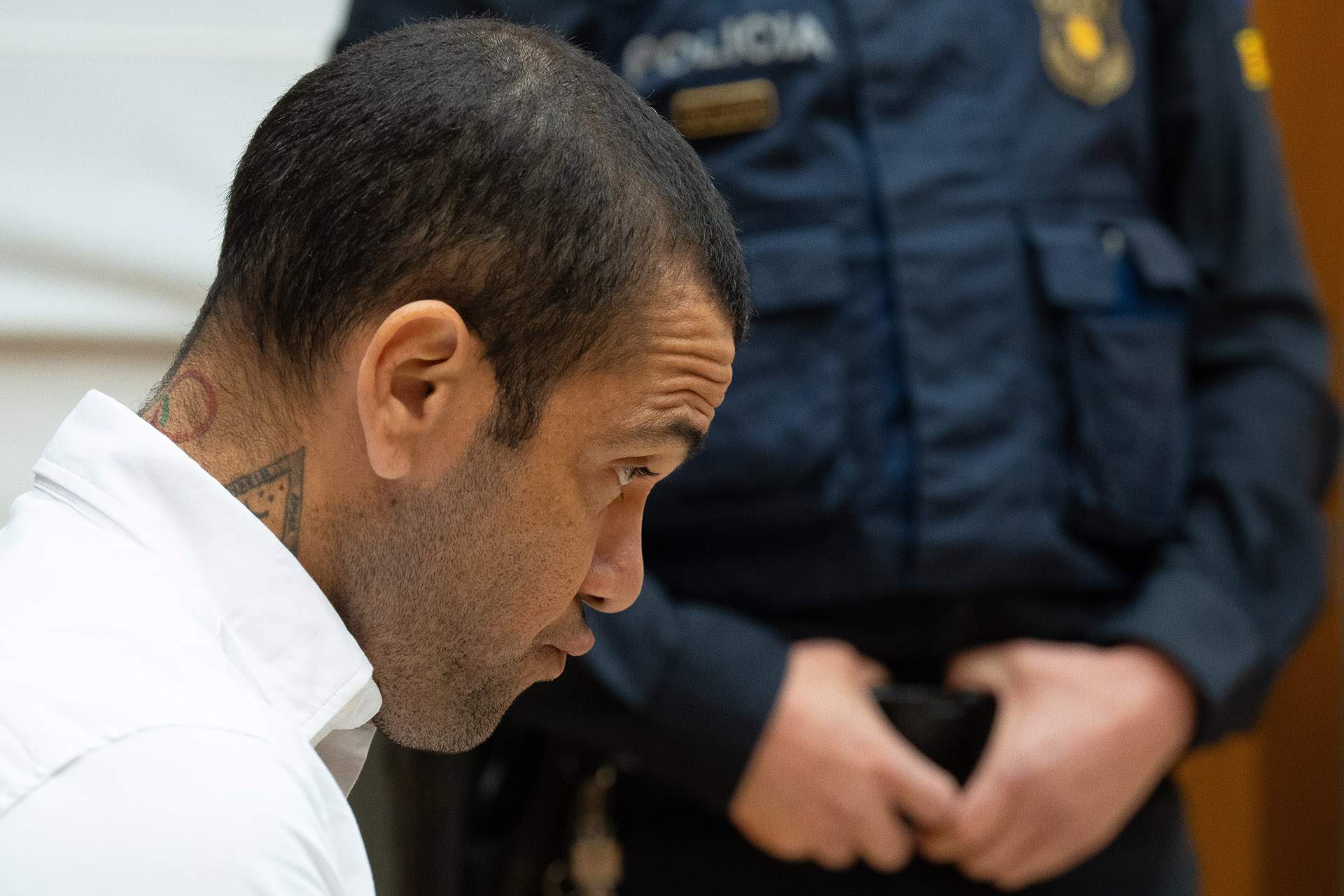Dani Alves answered only the questions from his defence lawyer, Inés Guardiola, in this Wednesday's third session of the Barcelona trial at which the former Barça star is accused of sexual assault. He asserted that the complainant had consented to the sexual relations that he had with her in the toilet of the Sutton nightclub, first fellatio and then coital penetration, which he explained and demonstrated from his seat in the courtroom. "She didn't say anything to me, if she wanted to leave, she could have done. I'm not a violent man. She didn't say anything to me," he responded to his lawyer's questions. Alves broke into tears when asked how he found out about the sexual assault complaint that night.
His lawyer's first questions were about what he had to drink that night, December 30th, 2022, before going to the Sutton nightclub in Barcelona, where he was offered the private room Number 6, as he is a regular customer, he said. The lawyer also asked him about his financial situation and he explained the contracts that had been broken off as a result of the sexual assault complaint.
An alternative penalty
At the end of the brief interrogation of Alves, the victim's lawyer, Ester García, gave the definitive statement of her sentence demand, without altering it: she called for Dani Alves to be imprisoned for 12 years for sexual assault. The public prosecutor Elisabeth Jiménez also retained her original accusation, calling for the Brazilian to be imprisoned for nine years. Both public and private prosecutions demand compensation of 150,000 euros for the victim.
The defence lawyer, for her part, responded by asking for the acquittal of Alves or, alternatively, a sentence of one year in prison and 50,000 euros in compensation, applying the mitigating factors of drunkenness and reparation of damages.
The different versions given by Alves
Over the past year, the former FC Barcelona star has offered three different versions of the sexual assault to the investigating magistrate. His first response was to deny that there had been sexual relations, then he admitted the fellatio, and when biological evidence was found on the woman's clothes, he admitted the sexual penetration. He affirmed that he had hidden it so that his wife, Joana Sanz, would not find out. By contrast, the complainant has always declared that it was sexual intercourse without consent, as she reiterated on the first day of the trial.
In addition to calling for her client's acquittal, Alves's lawyer also focused on making it clear that he was very drunk that night at the Sutton nightclub, in order to make the case that his drunken state was a mitigating factor. The key to the trial, though, is the question of whether or not consent was given for what happened in that small toilet in the VIP area of the Barcelona nightclub.
No injuries
The third session of the trial of the ex-Barça footballer also focused on the questioning of expert witnesses who had examined the victim, and psychologists who were part of Dani Alves's defence case. Forensic experts from the Institute of Legal Medicine and Forensic Sciences of Catalonia (IMLCFC) gave credence to the victim's version, and indicated that recent social and professional changes in her life are a result of what she went through, after witnesses had testified earlier that in the last year, the woman has lost confidence, scarcely leaves her home, and is not working.
However, an expert testifying for the Alves defence went as far as to affirm that "if there are no vaginal injuries, it means that intercourse was not that traumatic". The statement was criticised by a forensic scientist of the court, who asserted: "Not having an injury does not mean that there is or isn't consent."
Consent
Thus, at the end of the trial, the judges of Section 21 of the Barcelona Audience provincial court will have to determine whether what happened in the Sutton toilet consisted of consensual relations or sexual assault. The court will have to choose a version, that of Alves or that of the woman, and corroborate it with peripheral evidence, such as the testimony from the Mossos police or the expert witnesses.
In fact, the two psychologists called by the Alves defence substantially reduced the strategy of asserting inebriation as an attenuating circumstance by admitting this Wednesday, under questioning from the private prosecution, that the footballer was aware of what he was doing that night in the Barcelona discoteque.

